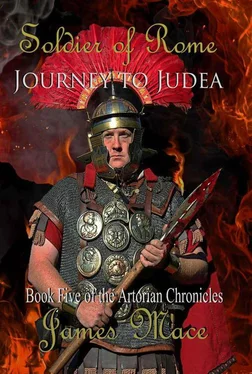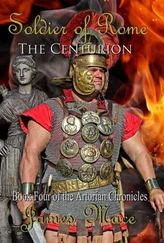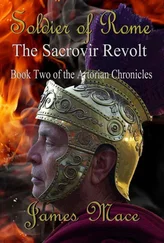James Mace - Soldier of Rome - Journey to Judea
Здесь есть возможность читать онлайн «James Mace - Soldier of Rome - Journey to Judea» весь текст электронной книги совершенно бесплатно (целиком полную версию без сокращений). В некоторых случаях можно слушать аудио, скачать через торрент в формате fb2 и присутствует краткое содержание. Жанр: Исторические приключения, на английском языке. Описание произведения, (предисловие) а так же отзывы посетителей доступны на портале библиотеки ЛибКат.
- Название:Soldier of Rome: Journey to Judea
- Автор:
- Жанр:
- Год:неизвестен
- ISBN:нет данных
- Рейтинг книги:5 / 5. Голосов: 1
-
Избранное:Добавить в избранное
- Отзывы:
-
Ваша оценка:
- 100
- 1
- 2
- 3
- 4
- 5
Soldier of Rome: Journey to Judea: краткое содержание, описание и аннотация
Предлагаем к чтению аннотацию, описание, краткое содержание или предисловие (зависит от того, что написал сам автор книги «Soldier of Rome: Journey to Judea»). Если вы не нашли необходимую информацию о книге — напишите в комментариях, мы постараемся отыскать её.
Soldier of Rome: Journey to Judea — читать онлайн бесплатно полную книгу (весь текст) целиком
Ниже представлен текст книги, разбитый по страницам. Система сохранения места последней прочитанной страницы, позволяет с удобством читать онлайн бесплатно книгу «Soldier of Rome: Journey to Judea», без необходимости каждый раз заново искать на чём Вы остановились. Поставьте закладку, и сможете в любой момент перейти на страницу, на которой закончили чтение.
Интервал:
Закладка:
“Justus!” Artorius said, walking over and placing a hand on his shoulder.
“How was I to know?” was all his friend would say.
Chapter XX X: Live for the King
The Passover season had mercifully ended, and Pontius Pilate returned to Caesarea, along with the First Italic Cohort. That a number of the Nazarene’s followers had rolled away the boulder in front of his tomb and spirited away his body did not matter; or at least it would not have, were there not numerous supposed sightings of him.
Several months had passed since the crucifixion, and it was well into summer. The numerous detections of him walking the earth, alive and well, were having an effect on many within the populace. Pilate was determined to put the issue to rest once and for all.
“If the Nazarene lives,” he stated, “Then let him come before me. Let me see the scars on his flesh, the holes in his hands and feet, and the wound to his side. If, indeed, he walks amongst us, I daresay the whole of the empire will bow before him and acknowledge him as a god among men!”
Many took the procurator’s remarks as condescending; a dare to this newest Jewish sect to produce their Messiah in the flesh before him. Those closest to him, particularly his family, knew that deep down he was afraid. What if Jesus, whose followers called the Christ, was indeed divine; a god who could not be killed by the weapons of men? Justus Longinus seemed to think he was, though he had mostly kept quiet about his feelings.
Still, he and his family were associating less with their Roman peers, and he spent more time with locals who had known Jesus of Nazareth intimately. As Justus had spent most of his career in the east, many of his friends and fellow soldiers dismissed his actions as simply those of one who was more familiar with eastern culture than with his own. And as his informant network was still very active in rooting out insurrectionists and those guilty of sedition, he kept himself immersed in these matters.
Centurion Cornelius was doing the same, although some dismissed this out of hand, due to his ongoing intimate relationship with the Judean woman, Rebekkah. That Roman soldiers had executed her brother did not appear to sway her feelings for the centurion.
Artorius rightly had his own suspicions, though he kept his thoughts to himself. In fact, he had yet to tell anyone of his own assessment of the Christ following the crucifixion. Instead of answers or assertion, all he could feel was confusion. He surmised that there were some things in this world that he simply would never understand, and he had to accept them as such. It was because of this that he avoided the subject altogether, even with Diana. And yet, it was because of the surreal nature of the Nazarene’s death and the aftermath that Artorius decided it was finally time to confide in his wife something he had never shared with anyone, and that evening he would take her on a walk along the sea.
That day Cornelius and Justus were dispatched to patrolling the area around Jamnia to the south. This was at the request of the local allied king, who was permitted control over the tiny sliver of land along the sea, much the same as Herod Antipas. Magnus and Praxus were conducting a joint maneuver exercise with Centurion Taurus’ cavalry, Julius’ men were on city patrol in Caesarea, and Artorius’ own century had the task of palace guard for the next month.
“We have enough men that we can run three shifts,” Valens noted as he went through the century’s roster. “Three squads on each shift can cover the entire palace easily enough, and that means we stand one squad down each day.”
“Make it happen,” Artorius said as he went through some other documents. “Insurrectionists keep mostly to the hills with the occasional raid on the smaller settlements, though Pilate is concerned they might become brazen enough to try and hit us here.”
“I would have thought smashing those bastards who tried to take down the Antonia Fortress would have taught them a lesson,” Valens mused.
“That will never happen,” Artorius grumbled. “These people learn what it means to defy Roman rule about as well as the Germanic barbarians we fought all those years ago.”
Once evening came, Artorius walked hand-in-hand with his wife, watching the waves glide over the sand. Diana knew what was troubling her husband, and that he had difficulty in expressing it.
“These last few months have been surreal,” she said, trying to coax him to finally open up to her.
“According to the newest sect of Judaism,” Artorius replied, “we crucified the Son of God, yet he still lives. I cannot say for certain that I believe this, but I have witnessed some things that can never be explained.”
“Such as?” Diana only persisted because she knew Artorius longed to tell her what had lain dormant within him for many years, since before they’d even met.
“It was after the Triumph of Germanicus,” Artorius explained, already feeling a great weight coming off his chest, though he could not fathom how his wife would react to his story. “Eight years had passed since the death of my brother, and yet I saw him.”
He went on to tell her about how after the Triumphal parade, while walking along a hill path alone, he’d met another legionary and spoken to him at length. The man was not just a Roman soldier, but the soul of his long-departed brother. He spoke very quickly, and as soon as he finished he felt like he was out of breath. Diana remained silent for some time, trying to comprehend her husband’s tale.
“I have never spoken of this to anyone,” Artorius emphasized, “Lest they think I’m mad. I daresay, you probably think I’ve lost my mind.”
“No,” Diana replied, slowly shaking her head and giving his hand a squeeze of reassurance. “Given the fantastic turn of events we’ve witnessed, my mind does not know what to think. My heart, however, believes you. And that is enough for me, my love.”
It was a routine patrol, stopping all who passed along the stretch of road leading from Jamnia to Joppa, and searching them for weapons and other contraband. After the release of Barabbas, Pilate was anxious to keep what remained of the rebels from reorganizing.
Both centuries encamped on the side of a hill that overlooked the main road. Despite its relatively flat appearance, the terrain was so rough that the only feasible way for carts to travel was on the dirt road that had been used for a thousand years already. A squad of legionaries waited at either end of the road with merchants and travelers reluctantly having their cargo and persons searched.
“Not exactly endearing ourselves to the populace,” Cornelius noted as he and Justus watched some of their soldiers searching the caravan wagon of a well-dressed merchant.
“Sedition and rebellion are rife in this province,” Justus replied. “And with every new sect that arises, more crazy zealots find yet another reason to take up arms against Rome.”
“At least the Nazarene’s sect taught peace and understanding,” Cornelius noted.
“That he did,” Justus replied. “Some of his followers I am not so sure about, though. The same arrogance that permeates much of the Jewish religious hierarchy infests them as well. I can’t help but wonder if the message will eventually be lost altogether.”
It was easier for Justus to speak with Cornelius about these matters. Whatever Artorius may have said at the crucifixion itself, he was not willing to discuss the matter further. For Justus Longinus, the centurion who had blasphemed against all gods after the death of his son, it was a type of awakening for him. Cornelius understood this, as he had heard the Nazarene speak on numerous occasions and was moved by his words.
Читать дальшеИнтервал:
Закладка:
Похожие книги на «Soldier of Rome: Journey to Judea»
Представляем Вашему вниманию похожие книги на «Soldier of Rome: Journey to Judea» списком для выбора. Мы отобрали схожую по названию и смыслу литературу в надежде предоставить читателям больше вариантов отыскать новые, интересные, ещё непрочитанные произведения.
Обсуждение, отзывы о книге «Soldier of Rome: Journey to Judea» и просто собственные мнения читателей. Оставьте ваши комментарии, напишите, что Вы думаете о произведении, его смысле или главных героях. Укажите что конкретно понравилось, а что нет, и почему Вы так считаете.












